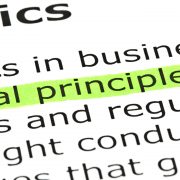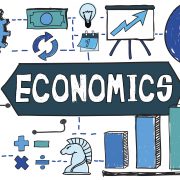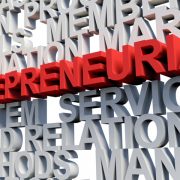Try to imagine a frozen-over train station in Hudson, New York, at 6:00 p.m. on a Sunday night on a holiday weekend. The interns and I had hoped there would be taxis there. We were wrong. It was a bad mistake. We had a 40-mile drive to make to get to the stone house at the American Institute for Economic Research.
The weather was not cooperating. All flights had been canceled. The roads were frozen over. The thermometer registered 7 degrees Fahrenheit. This was not a night on which you want to leave your home for any reason.
We tried Uber. No drivers. We tried again. No drivers. We started examining the benches at the train station to see if they could be used as beds. But the heating in the train station was not good. The forecast said that the temperature overnight would fall to 30 degrees below zero. We would wake with frostbite. Hey, it would make a good story.
I tried Uber one last time. Someone picked up! The car was on its way. Be there in 15 minutes, said the app. My goodness, what a world. Uber was only legalized here about a year ago. Now it is a lifesaver.
Right on time, a man’s car drove through the desolate parking lot, the tires crunching through the frozen snow. We left the station to go outside, put our bags in the trunk, and drove off, slowly and carefully because there was no point at which the tires met the road. This would be a perilous journey. We made it safely home. Seeing the warm lights shine through the windows as we drove up to the house was a beautiful sight.
The Calculus of Compassion
I’m so grateful to this nice man, this stranger who saved us, and the Uber app that made it possible. Along the way I asked about the motivation. I pointed to the money. He said that he will only make $30 but he is glad to help. That touched me, so I began to dig deeper, trying to find out what led him our way.
He said that he saw the first two requests. But he was sitting by the fire with his wife, safe from the storm. Why bundle up in such conditions? When the third request came in, he felt a pang of conscience. There are three people waiting at a desolate train station. They need help. He bundled up and set out on the frozen roads to be valuable to other people.
It’s a beautiful reminder: there are human beings behind these mobile apps. Drivers can reject or accept. It’s up to them. No municipal taxi was running. To come out on a night like this approaches a heroic enterprise. My initial assumption that the driver did it for the money was wrong. The money is nice but doesn’t motivate heroism. There is something else going on. He wanted to be valuable to others. He wanted to help.
Here we observe an interesting example of the complications of human drive and its interaction with the economics of the material world. Might the driver have shown up without the profit motive? Maybe. But how would he have known about our plight? We used a profit-making app that was built and is maintained through a system of profits. What’s more, it does in fact make sense that this driver would be compensated for his work.
Enterprise, this story shows, is moved forward through a complex set of human motivations that include the desire for money but also the desire to serve and be valuable to others. The material means to provide for ourselves and the desire to be useful to others are both crucial here, and they are not in conflict.
Greed and benevolence work together. Material acquisition and love of one’s neighbor are harmonious. It’s the combination of the two that makes up the driving force of economic progress.
I’m thinking of another case from the Hudson train station. There is a snack bar. The people there sell coffee, candy, muffins, and tea. I ordered a beer. The woman said they don’t carry it. I asked why not. She said it’s because the snack bar is run by a local charity and so they don’t think serving beer is a good idea. I asked what it means for a snack bar to be run by a charity. She said it means that she doesn’t get paid. She is just there to raise money by selling things to people so that all the profits (however meager) go to the charity.
Realizing this changed my whole outlook on the enterprise. But for love, compassion, dedication, commitment to the well-being of others, travelers could not get coffee and snacks. Because people are willing to commit their time without pay, it is there, not as a profit-making enterprise but as a charity, helping on both ends: tending to the needs of travelers and also raising money to help the community.
Here again we see the fusing of economics and love. It comes together without dictate, without mandate, without central direction, without a top-down command to care for others. The motivation comes from within. But here again we see on display this essential but often unrecognized motivating force: the need to be valuable to other people.
Strangers and Love
Let’s return to my driver and the mobile app that brought his services to us. He was a stranger. I had never met him. Never will again. And yet we had a beautiful experience together, all thanks to technology and enterprise.
There are political arguments about this. Is Uber putting out of business the taxis? Is it paying drivers enough? Should drivers have to submit to a great degree of regulation? Because of these questions, cities have banned Uber in many parts of the world.
Think of the human loss, the missed opportunities to bring people together for mutual benefit, the forgone chances for people to serve people. This is what enterprise is all about.
Those who do not understand this miss the whole point. Economics is not just about making money. It’s also about a chance to be valuable to others, to the world, to yourself. Banking money and showing love can and do exist in a harmonious relationship. Bring them together under just the right conditions, and you feel the same inner warmth we all felt when finally arriving back home in safety, preparing to sleep well with the knowledge that thanks to free enterprise, we would wake without frostbite and our wonderful benefactor would wake knowing that he both did a good deed the night before and made just enough money to say it was materially worth his time.
This article first appeared at AIER 1-21-19.
Jeffrey A. Tucker is Editorial Director for the American Institute for Economic Research.












